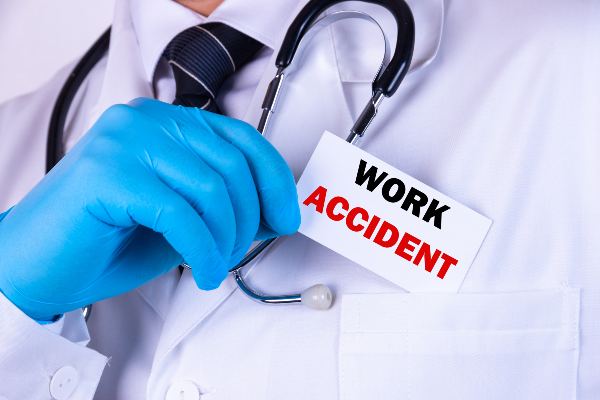
Menu

Menu
Many Texas employees, even experienced workers, suffer job injuries yearly. Unfortunately, a work-related injury can knock you out so that you can't work for a while. Receiving medical treatment and being unable to work can threaten your income. That's why American states, including Texas, have workers' compensation laws.
These laws allow you to file a compensation claim with your employer and their insurance company. If you're successful, you can receive compensation benefits, including medical bills and part of your weekly wage. However, it'll help to have an experienced lawyer from Calhoun Meredith, working on your workers' compensation benefits claim. This way, you can rest assured that you'll get the best personal injury attorney.
Not all injured workers in Texas qualify for workers' compensation insurance. Firstly, unlike other states, Texas comp laws don't mandate all employers to buy workers' compensation coverage. So, your employer may not have comp coverage. Business owners who have workers' compensation insurance, or not, are referred to as subscribers and non-subscribers, respectively. Therefore, the first step to knowing your eligibility status is finding out whether your employer has comp insurance.

Below is a list of Texas employers the law requires to have workers' comp insurance.
Essentially, it's private employers that can choose not to subscribe to compensation insurance. An employer can purchase coverage from an insurance company. They could also self-insure individually or as a group.
Self-insurance is subject to certain conditions under the Texas Workers' Compensation Act. Luckily, the Texas government doesn't leave you in the dark about your employer's coverage status. You can find out if your boss has workers' comp insurance on the state's database.
If your employer has workers' compensation insurance, then you'll be eligible if:
If you file a successful workers' compensation claim in Texas, you should start receiving comp payouts almost immediately. However, there's a slight chance that your employer will deny your claim. If your claim is accepted, you can receive:
This class of compensation covers your medical expenses, including medical bills for surgical repair. You may be eligible to recover for past and ongoing treatment. However, in Texas, you must get a medical exam from a state-approved doctor.
If you suffer significant injuries that cause permanent impairment and severe pain, you can get lifetime medical care benefits. Your medical records are indispensable in proving this compensation type.
Income benefits provide a stable income source while you're off the job. Although the value is lower than your actual wage, it's better than having nothing. Your comp settlement income benefits include:
It's not unusual for a worker to die from a work injury or disease. In such cases, the deceased's survivors can receive wrongful death benefits. It would also be unfair for the family to foot the burial and funeral expenses. Therefore, they can also recover burial expenses.
The law doesn't entitle all family members to this benefit class. Below are the eligible members of the decedent's estate:
How much to expect for a workers comp settlement? The next issue is the average settlement from a successful workers' comp claim. If you don't know how much to expect, you won't know if you're receiving unfair weekly benefits. Your comp rate is the amount of money the comp insurance company sends you every week.
Essentially, your Average Weekly Wage (AWW) determines your comp rate. Your AWW is the average sum your employer paid you in the thirteen weeks preceding your injury or illness. If you didn't work for your employer in those 13 weeks, they'd calculate the rate with another employee's rate having the same job.
Furthermore, your AWW includes additional benefits such as:

Finally, your comp benefits amount differs based on the benefits type.
A Statute of Limitations specifies the timeframe for filing civil claims. You don't have all the time in the world to initiate a suit. Therefore, if you fail to file a timely action, you may lose your right to compensation.
After sustaining a work-related injury or occupational disease, you must notify your employer. This is the first step in the workers' comp claim process. They must get this notice within 30 days from your injury date. However, you don't have to wait this long to report your injury. The earlier you register your damage, the faster you can get medical treatment and start receiving benefits.
If you don't notify your employer of your medical condition within 30 days, you may lose your right to the settlement money. Furthermore, if you file a late notice, the compensation insurance company may argue that your wounds aren't workplace injuries.. Therefore, the earlier your notification, the easier it is to connect your injuries to your job.
You can file an official Employee's Claim for Compensation for a Work-Related Injury or Occupational Disease (DWC Form-041) with the Division of Workers' Compensation (DWC). The DWC administratively administers Texas workers' compensation processes. You can file your claim physically or online. Whatever media you choose, you have to file this form within one year from your injury date. If it's an occupational disease, you have one year from the day you linked your illness to your job.
Many injured employees are scared of filing a workers' compensation claim because they fear retaliation. They feel that their employer will fire them rather than pay them any benefits. While it's best to file a claim for benefits, these fears aren't baseless.
Many employers retaliatorily sack their workers for demanding workers' comp benefits. It's significantly worse in Texas because Texas is an employment-at-will state. This means that a business owner can fire an employee for any reason or no reason at all.
However, your employer can't fire you merely for filing for workers' compensation. Section 451.001 of the Texas Labor Code protects you from such indiscriminate firing. Furthermore, if the work injury caused you disability, they can't sack you either. This is because the Americans with Disabilities Act protects you from discrimination. This federal law applies in Texas, so you're safe.
If your employer fires you for filing a good faith workers' compensation claim, you can sue them. You can still recover your lost wages during the time you were off work. You may even recover punitive damages. Finally, the court can reinstate you to your job and order that your employer pays you your workers' compensation benefits..
Yes, although Texas workers' compensation laws significantly favor employees, you can be disqualified from receiving any payment. If the law disqualifies you, it won't matter that you suffered a work injury; you'll lose the right to benefits. There are limited instances where the law can disqualify someone from receiving benefits.
They include where:
These instances are rare, but they occur sometimes. In such cases, the employer will often deny the claim and state the reason. If you think your employer or their insurance carrier wrongfully denied your claim, you can demand a comp hearing. At this stage, it'll be best to have a workmans comp lawyer to ensure you get the compensation you deserve.

It's one thing to know that you deserve a workers' comp settlement because of your workplace accident. However, calculating your workers' compensation benefits is a different issue. To get a fair settlement, it'll be best to hire a comp attorney to sit through your comp settlement and comp claim.
Furthermore, running around for your payment of benefits during your healing process isn't ideal. It could affect your medical improvement process. Therefore, it'll be best to leave the workers' comp settlement process to a comp lawyer from Calhoun Meredith.
Our attorneys have extensive experience in workers' comp payouts. We especially know how to calculate individual weekly payments accurately. Therefore, it'd be best to call us today for a consultation on your claim.